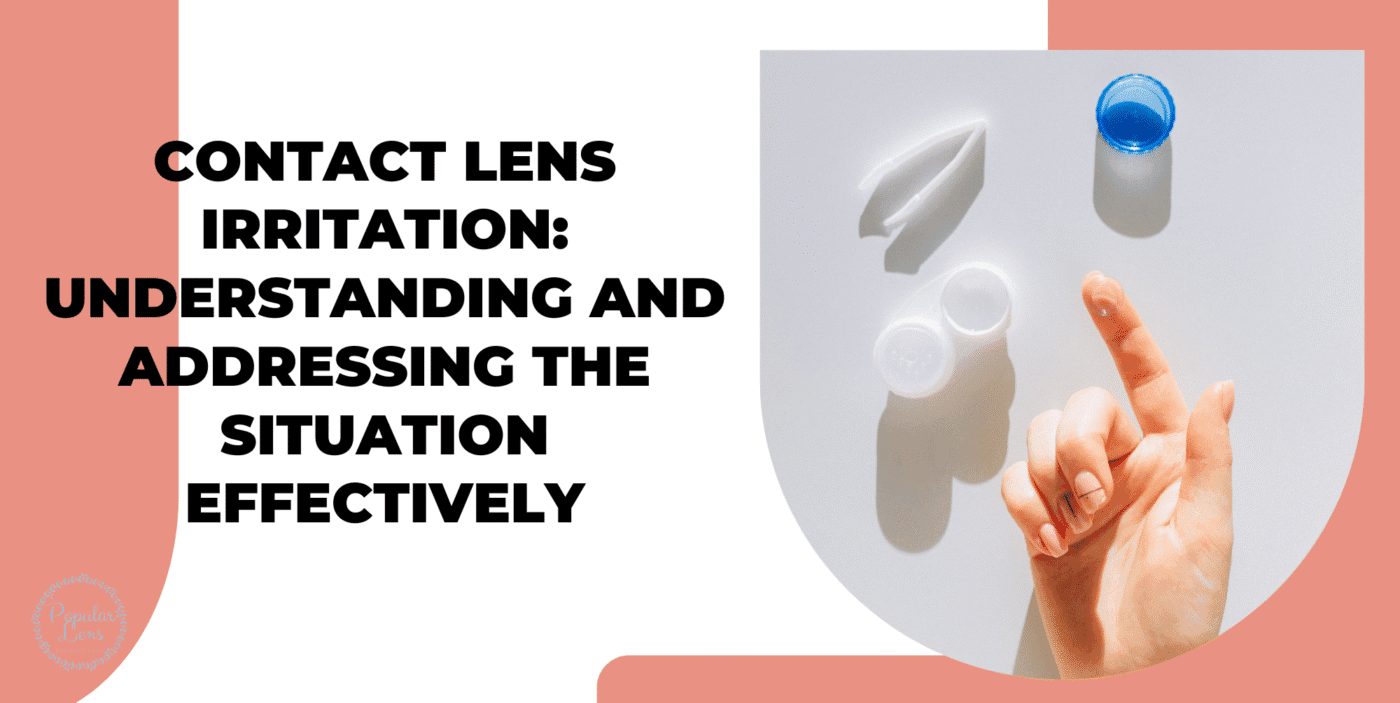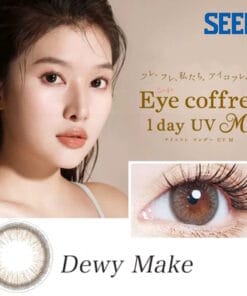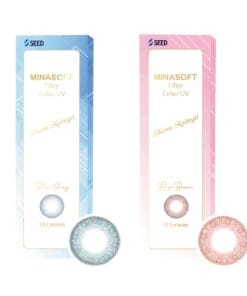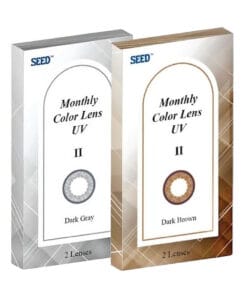Good Habits, Lifestyle
Contact Lens Irritation: Understanding and Addressing The Situation Effectively
Contact lens irritation can be prevented and addressed promptly if users know the signs to look for. There are many causes of contact lens irritation that users should be aware of. Listed below are some of the signs to be aware of.
Contact Lens Irritation 1: Rinse Your Lenses
Rinsing directly on your contact lenses is one of the key first lines of protection against or treatment for irritation of contact lenses. Irritation is usually caused by debris, protein deposits, or bacteria on the lens surface leading to pain and infection risk if not treated.
Rinsing your lenses with sterile clean contact lens solution eliminates such irritants and hence preserves lens purity and reduces eye irritation risk. Never cleaning lenses with saliva or tap water is essential since they carry bacteria that could enhance the risk of severe eye infections.
-
 SEED Eye Coffret 1day UV Dewy Make21.82USD
SEED Eye Coffret 1day UV Dewy Make21.82USD -
 SEED Eye Coffret 1day UV Starry Make21.82USD
SEED Eye Coffret 1day UV Starry Make21.82USD -
 SEED Minasoft 1Day Color UV30.91USD
SEED Minasoft 1Day Color UV30.91USD -
 SEED Monthly Color Lens UV II Cosmetic Contact Lenses21.82USD
SEED Monthly Color Lens UV II Cosmetic Contact Lenses21.82USD -
 ColourVUE Sparkle Monthly Disposable27.27USD
ColourVUE Sparkle Monthly Disposable27.27USD -
 MaxVUE Airsoft Multifocal Monthly Disposable Contact Lenses52.73USD
MaxVUE Airsoft Multifocal Monthly Disposable Contact Lenses52.73USD
Rinsing lenses should also be done carefully but thoroughly to guarantee that all remnants and deposits are removed prior to reinsert. Good rinsing also preserves the lens’s moisture, which is vital for daytime comfort. Removing the lenses and rinsing them right away can usually offer fast relief by flushing out irritants that may be causing redness, itching, or burning.
It’s important to refrain from using the lenses and see an eye care practitioner to rule out infection or more serious conditions, however if irritation lasts after rinsing and lens removal Regular rinsing and correct lens care practices including cleaning and disinfecting with suitable solutions greatly reduce the risk of irritation. Rinsing your contact lenses properly is a basic but good way to guarantee eye health, comfort, and safe lens wear.
Contact Lens Irritation 2: Practice Good Hygiene

Good hygiene is one of the most important preliminary measures in preventing and treating contact lens irritation. Sitting directly on the eye, contact lenses are therefore easily contaminated by germs, fungus, or other risky pathogens that might cause irritation or major eye infections. Good lens handling with clean hands helps to preserve eye comfort and health.
Before handling your lenses, always wash and dry your hands completely; this little practice helps to reduce the transfer of germs, oils, and dirt to your eyes. Using just recommended cleaning products to disinfect lenses is equally important as avoiding replacement of water or saliva, since these might introduce harmful bacteria or damage the lenses. Furthermore important, contact lens storage should be replacing the case every three months to avoid bacterial accumulation and always use a clean lens case filled with fresh solution.
Refuse it totally and restock to avoid topping off an old solution with new. Another important hygiene habit is consistently following your eye care practitioner’s advised lens replacement schedule, as overused lenses collect protein deposits and bacteria that irritate the eyes. Unless expressly permitted by your eye doctor, also avoid using lenses while swimming, bathing, or in dusty areas as water and pollutants can cling to lenses and irritate or infectious response may result.
Thus, good hygiene directly enhances comfort and safety by reducing irritation risks, protecting the sensitive eye surface, and fostering long-term eye health. Consulting an eye care expert right away is essential to deal with any underlying problems before they aggravate if discomfort remains despite good hygiene.
Contact Lens Irritation 3: Consult Eye Doctors
One of the most crucial actions to guarantee your eye health is preserved and protected is to see an eye doctor for contact lens discomfort. Although little discomfort can occasionally be treated with lubricating drops or better hygiene, persistent or worsening symptoms such as redness, burning, blurred vision, or a gritty sensation might indicate a more serious underlying problem such as an infection, corneal scrape, or allergic reaction.
A thorough eye exam conducted by eye care professionals can help them to correctly determine the cause of the irritation. They can evaluate if your present cleaning solution or method is helping to create problems as well as whether your lenses are the appropriate kind and fit. To lower the risk of buildup and contamination in certain instances, your doctor could suggest switching to daily disposable lenses.
-
 SEED Eye Coffret 1day UV Dewy Make21.82USD
SEED Eye Coffret 1day UV Dewy Make21.82USD -
 SEED Eye Coffret 1day UV Starry Make21.82USD
SEED Eye Coffret 1day UV Starry Make21.82USD -
 SEED Minasoft 1Day Color UV30.91USD
SEED Minasoft 1Day Color UV30.91USD -
 SEED Monthly Color Lens UV II Cosmetic Contact Lenses21.82USD
SEED Monthly Color Lens UV II Cosmetic Contact Lenses21.82USD -
 ColourVUE Sparkle Monthly Disposable27.27USD
ColourVUE Sparkle Monthly Disposable27.27USD -
 MaxVUE Airsoft Multifocal Monthly Disposable Contact Lenses52.73USD
MaxVUE Airsoft Multifocal Monthly Disposable Contact Lenses52.73USD
Should an infection or inflammation be noted, they could also suggest treated droplets or other medicine. One possible outcome of postponing a professional consultation is corneal ulcers, which untreated could cause permanent eyesight loss. By asking quick professional advice, you not only treat the present issue properly but also get personalised recommendations to avoid next pain.
Keep in mind that nothing can replace the value of expert care from a certified eye doctor — none of online suggestions or over-the-counter treatments. When in doubt, give your eyesight top priority; see a specialist for peace of mind and long-term eye health.
Contact Lens Irritation 4: Check Lens Fit And Prescription

An incorrect lens fit or an obsolete prescription is one of the most neglected yet essential reasons of contact lens irritation. Even minor variations in the form or size of your eye might affect the fit of your lenses, causing discomfort, redness, or hazy eyesight.
An unsuitable lens might either slide about too much or press against the cornea, causing friction and discomfort that could eventually damage the surface of the eye. Also, a prescription that no longer fits your visual needs might irritate your eyes, cause straining, and cause pain in wearing glasses. To properly solve this problem, one should arrange frequent eye checks preferably once a year or as advised by your eye care professional.
Your optometrist will evaluate your eyesight as well as the curvature and general condition of your eyes during these checkups to guarantee your lenses fit correctly and your prescription is still valid. Contact your eye specialist right away if you experience ongoing pain; do not disregard it. They could advise switching to a lens type made for sensitive corneas or dry eyes. Sometimes simply changing your lens’s material or brand can greatly increase comfort.
Your eyes can change with time; what suited you a year ago could not be best now. A straightforward but effective action in avoiding contact lens discomfort and preserving long-term eyesight is staying active with your lens fit and prescription.
Contact Lens Irritation 5: Replace Lenses And Cases Regularly
Regular replacing of both lenses and their storage cases is one often neglected but really important thing to help avoid contact lens irritation. Even with appropriate cleaning, contact lenses gather deposits over time including proteins, lipids, and environmental trash.
These buildups might cause pain, hazy vision, and a higher risk of eye infections or allergies responses. Like this, the lens case used daily to store and disinfect lenses can become a breeding ground for bacteria and fungi if not cleaned and replaced regularly. To reduce irritation and preserve eye health, experts advise replacing soft contact lenses as daily, bi-weekly, or monthly calls. Using lenses beyond their intended life risks their breathability and integrity, therefore raising the risk of inflammation and dryness.
-
 SEED Eye Coffret 1day UV Dewy Make21.82USD
SEED Eye Coffret 1day UV Dewy Make21.82USD -
 SEED Eye Coffret 1day UV Starry Make21.82USD
SEED Eye Coffret 1day UV Starry Make21.82USD -
 SEED Minasoft 1Day Color UV30.91USD
SEED Minasoft 1Day Color UV30.91USD -
 SEED Monthly Color Lens UV II Cosmetic Contact Lenses21.82USD
SEED Monthly Color Lens UV II Cosmetic Contact Lenses21.82USD -
 ColourVUE Sparkle Monthly Disposable27.27USD
ColourVUE Sparkle Monthly Disposable27.27USD -
 MaxVUE Airsoft Multifocal Monthly Disposable Contact Lenses52.73USD
MaxVUE Airsoft Multifocal Monthly Disposable Contact Lenses52.73USD
Every use the lens case ought to be emptied, washed with fresh contact lens solution (not water), and air-dried. It ought to also be changed at least once every three months or more often if signs of pollution or wear show up. Neglecting this hygiene routine could cause major eye problems including corneal ulcers or keratitis. Wearers can greatly lower the risk of contact lens irritation and guarantee a better, more pleasant experience by following a disciplined replacement schedule.
This proactive approach not only shields eyesight but also aids in spotting and removing a frequent cause of chronic discomfort, unclean or outdated lenses and cases. One of the most efficient means to keep good, irritation-free contact lens use is consistency in these behaviours.

We are a company of optometrists & opticians. We focus on providing our customers with their preferred optical products to improve visual acuity and enhance their quality of life. At PopularLens, you will find niche and exclusive brands.
 Free Shipping within SG With Order Over $80
Free Shipping within SG With Order Over $80 Lowest Price Guarantee
Lowest Price Guarantee






